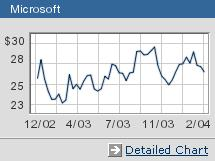
NEW YORK (CNN/Money) -
What would you do with $52.8 billion?
For most of us, it's a waste of time to think for a second about how to spend that much money. Heck, the lucky winner of last week's big Mega Millions jackpot is going to get only $230 million -- and that's before taxes.
But the debate about what to do with $52.8 billion is not just daydream believing for Microsoft Chairman Bill Gates and CEO Steve Ballmer. Microsoft (MSFT: Research, Estimates) actually has that much cash on hand.
To put in perspective how much moolah that really is, there was some speculation a few weeks ago about Microsoft using some of its dough to make a white knight bid for Walt Disney after Comcast made its unsolicited offer.
That probably will never happen.
But the mere fact that Microsoft could probably pull off such a deal -- Disney's market value is about $54 billion -- raises an interesting question: Shouldn't Microsoft use some of its bling-bling for acquisitions?
A Microsoft spokeswoman said the company does not comment on merger speculation.
Where's the growth?
Still, the biggest complaint most investors have about Microsoft is its mundane growth prospects. Sales and earnings are only expected to rise about 7.5 percent in its next fiscal year and the consensus forecast for long-term earnings growth is 10 percent.

| |
|
Shares of Microsoft have done little as of late...even though many large tech rivals have surged.
|
|
Sure, Microsoft is wise to keep a certain amount of cash on reserve given the company's risks from litigation. Microsoft has yet to settle an antitrust case with rival Sun Microsystems and is still facing a probe by the European Union. Japan's government is investigating the company as well.
But nobody thinks Microsoft needs more than $50 billion to cover potential fines or settlements.
To that end, Microsoft CFO John Connors, speaking at a Goldman Sachs tech conference Wednesday, said the company will finally have some detailed information about what it plans to do with its cash before its next analyst meeting in July. That's a good sign.
Expect more talk about how Microsoft should increase its dividend. Mister Softee's yield is about 0.6 percent, which ranks among the lowest of the 30 stocks in the Dow industrials.
Raising the dividend would be nice but consider this: Microsoft's current dividend, based on 10.8 billion shares and a payout of 16 cents a share, costs the company about $1.7 billion a year. So if Microsoft decided to double its dividend again soon, after doing so in September, the payout would still only cost some $3.4 billion a year.
| Recently in Tech Biz
|

|
|
|
|
Microsoft needs to do more.
Knox Fuqua, manager of the AAM Equity fund, wants the company to make acquisitions. He said steps such as boosting the dividend, making a one-time special payout or buying back more stock would only appease investors in the short-term.
"That's all great for shareholder morale but long-term, it's not a benefit to Microsoft. With the amount of cash they have, they need to do something with that to increase growth," Fuqua said. The stock is the largest holding in Fuqua's fund.
Stock has stalled
Fuqua thinks Microsoft could do something really bold with its cash. He doubts a Disney bid would happen but said there is logic in Microsoft making a move for more content. "Microsoft needs to shock the world right now," said Fuqua. "The market is waiting for it."
David Hilal, an analyst with Friedman Billings Ramsey, said that if Microsoft does go on a shopping spree, it could bulk up its corporate software and home entertainment businesses.
Microsoft has already shown a willingness to do deals in the corporate software area, buying Great Plains and Navision in the past few years. The company's two corporate-focused divisions -- servers and tools and business solutions -- accounted for 23 percent of Microsoft's total sales in its fiscal second quarter.
And on the home entertainment side, anything that Microsoft could do to help its Xbox video game franchise in its battle against Sony's PlayStation2 would be key.
Of course, Microsoft would probably face intense regulatory scrutiny if it wanted to pull off a major deal. And the fact that the Department of Justice is taking a long hard look at Oracle's proposed bid for PeopleSoft is a sign the government may frown on large software mergers.
"If Microsoft tried to buy somebody big in an area that they are already in, the DOJ would have a field day," said Hilal.
Still, Microsoft needs to come up with some plan to excite investors. The stock has been a huge laggard during the tech rally of the past year and a half. While the Nasdaq has surged 82 percent since hitting its nadir in October 2002, Microsoft's stock is up just 21.5 percent.
"The stock is for widows and orphans now. Welcome to middle age, Bill," said Henry Hewitt, manager of the Light Revolution fund, which owns shares of Microsoft.
Hewitt said a clearly defined vision for growth could rejuvenate the market's interest in the stock, adding that expanding into entertainment might be a good move. The problem though, is that the best companies Hewitt thinks Microsoft could buy, namely Sony or Electronic Arts, are probably not looking to sell out.
Now I'm not suggesting that Microsoft start throwing around greenbacks willy-nilly. But investors are growing increasingly tired of seeing little benefit from Microsoft's Scrooge McDuck-esque hoarding of cash.
Go buy something, Bill. What are you waiting for?
Sign up to receive the Tech Investor column by e-mail.
Plus, see more tech commentary and get the latest tech news.

|

